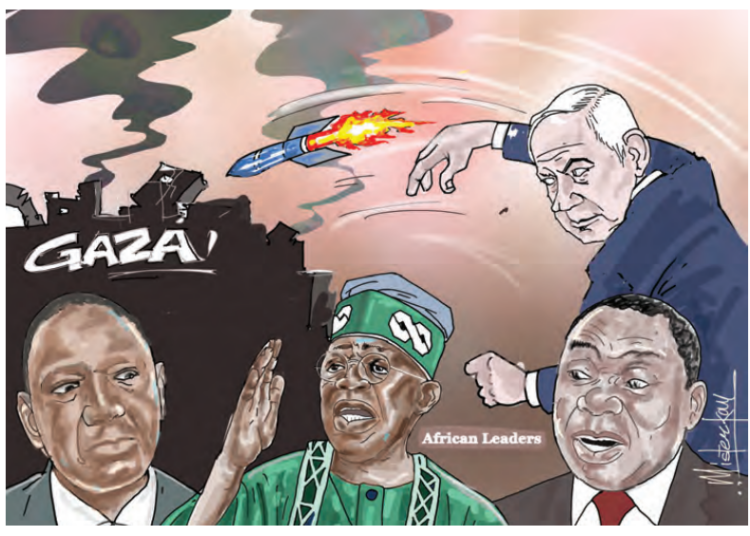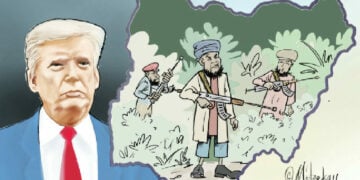When the Israeli-Hamas war started one year ago, it didn’t look like it would last long.
Israeli Prime Minister Benjamin Netanyahu’s promise to avenge the deaths of over 364 Israelis killed and dozens taken hostage by Hamas on October 7 at a music concert left little doubt it was going to be a bloody phase. But how long, ugly or bloody, it would take for Netanyahu to kill the last Hamas, which was his minimum condition for peace, was hard to tell.
Unfortunately, with over 42,000 killed in Gaza, including women, children, UN workers and journalists, over 1500 Israelis killed and the fate of 101 hostages unknown, the last Hamas is still at large. The war has spread to Lebanon, and Iran is enmeshed.
War coming?
The regional conflict the world had tried to prevent is upon us, and with less restraint and increasing provocation, talk about another world war that sounded farfetched only months ago now seems probable.
The war may not yet be on Africa’s doorstep, but the continent has not been an onlooker. There have been widespread pro-Palestinian protests in South Africa, increasing domestic pressure on President Cyril Ramaphosa’s government. Art was weaponised in Cape Town flats, with some residents deploying murals and graffiti in Palestinian flag colours.
South Africa’s case against Israel at the International Court of Justice (ICJ) has been perhaps one of the most audacious jurisprudential efforts to hold Israel to account. Since South Africa dragged Israel to the ICJ last December and obtained a ruling to stop Israel from potentially genocidal acts, Africa’s involvement in the war by other means has become more salient.
By deciding to drag Israel, South Africa risked bilateral relations of R876 billion in trade. Still, it counted it as a fair price not just to assuage domestic pressure but also as a matter of conviction for ties that run deep and to honour its own historical experience.
Beyond South Africa
Israel has managed to ignore the court and taken advantage of the U.S., blindsided by weak leadership and the November 4 presidential election, to ramp up attacks in the region. With no let-up in the Russia-Ukraine war and the supply chain problems it has created, the escalation in the Israel-Hamas war has forced African countries to brace up.
Egypt has been on edge because of the impact refugee spillover and possible military action could have on its fragile economy, never mind the potential influx of militant Palestinian jihadists. It has resisted suggestions for refugees to camp in Sinai.
In August, Algerian President Abdelmajid Tebboune promised to send troops to Gaza. Yet, the president and Hamas leaders knew that was only a political statement – Cairo would never grant passage that could potentially bring the war home.
In Ghana, the Democratic Republic of Congo (DRC), and Kenya, the sentiment is pro-Israel, particularly in Kenya. Shortly after the outbreak of the war, President William Ruto tweeted that Kenya stood side by side with Israel and condemned the October 7 attack outright.
One year later, Kenya’s position has not changed, which some have argued is partly informed by the robust economic ties with Tel Aviv, especially in agriculture and the security challenge that al-Shabaab poses to Kenya.
The authorities believe whatever weakens Hamas weakens al-Shabaab, a terror group that staged more than 10 attacks last June/July alone in eastern Kenya, killing 30 security officers. In Israel’s pursuit of the last Hamas, Kenya feels obliged to take more than a passing interest because a defeated Hamas means less oxygen for its radical sympathisers elsewhere, including al-Shabaab.
Giant asleep
Nigeria, the continent’s largest economy and its most populous, has offered a muted, somewhat confused response to the Israeli-Hamas war. The official line, worn for use after decades of lip service and repeated at this year’s UNGA, is a two-state solution. That’s also the official position of the African Union (AU). However, the precarious, almost 50-50 Muslim-Christian population leaves the Nigerian government walking on eggshells in Israeli-Palestinian matters.
It is cautious not to offend the predominantly Muslim North and potentially spark deadly pro-Palestinian sectarian protests. It is also careful not to offend Christian sensibilities in the South, especially a growing evangelical population that considers itself a part of New Testament Israel.
Over the years, Nigeria has cooled from a radical supporter of liberation struggles on the continent and elsewhere to a somewhat insular patron. It has been subdued by its internal problems of insecurity and economic hardship.
It’s not certain how the Nigerian government would respond to Israel’s current two-pronged war in pursuit of Hamas and Hezbollah, with Iran in the mix. But an escalation might, among other things, affect oil prices, Nigeria’s mainstay, and complicate the already fraught domestic petrol product market.
Experts have said a repeat of the oil market chaos caused by the Middle East crisis of 1973-74 is unlikely. However, with a far larger population and a barely competitive economy, today’s Nigeria is far from the conditions that made it benefit from the Middle East chaos five decades ago.
More migration headache
Yet, the price Africa is paying is beyond the reading of its vital economic signs. Of the thousands caught up in Lebanon, the new epicentre of the conflict, many are African migrant workers. Following the escalation of the conflict, the Kenyan government has asked approximately 26,000 nationals in Lebanon to get help if they need to evacuate.
The governments of Ethiopia (another African country with a significant migrant population in Lebanon), Uganda, Nigeria and South Africa are watching closely in a phase that may worsen the already complicated global migration and humanitarian crisis.
What started as the hunt for the last Hamas a year ago has grown into the pursuit of the last Hezbollah, and now, it seems, to their last supporters as well. However, as I wrote in a previous article, history teaches that war against an idea is unwinnable. Israel’s existence is proof enough if Netanyahu and the remnant hardliners in his cabinet cared to learn.
Untested leverage
Unlike in the 1970s, when few African countries had diplomatic ties with Israel, the country’s footprint on the continent has grown to the point where 44 of 54 countries have recognised Israel’s statehood.
It’s fair to argue that Netanyahu only listens to Netanyahu. Yet, for whatever it is worth, the continent does not have to wait to pay a much higher price for this war before closing ranks and leveraging its closer ties to pressure Israel to accept a ceasefire. Except, of course, if the closer relationship means nothing.





